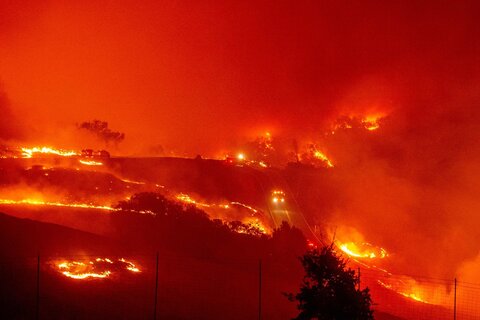
from the NY Times
Seriously, do you have to ask? In case you were wondering, the wildfires that are currently ravaging the state have as much to do with climate change as they do with the ineptitude of Pacific Gas & Electric. PG&E has been serving California since early in the last century, and yes, their equipment is getting older and more prone to failure. But an errant random spark is harmless, or the fire it starts is easily controllable, unless higher temperatures and reduced rainfall have turned shrubbery into tinder and the hot, dry Santa Ana winds come howling out of the Nevada desert at hurricane force, topping out at more than 80 miles per hour and spreading glowing embers like a Cuisinart without a lid.
Not convinced that climate change is the culprit? Correlation is not causation, but the following should make you think. According to NOAH, the National Oceanic and Atmospheric Administration, the past five years have been the five warmest years on record. Also according to NOAH, only four times since the middle of last century has has the total area burned in a single year by wildfires in the United States exceeded 13,900 square miles, an area larger than Belgium. It just so happens that all four fire-prone years were in the same decade as the five warmest years—this decade. Can any rational thinker really chalk up the coincidence to an unfortunate run of "weird weather?"*
The thing about climate change is that it's not only the first-order effects like scorching temperatures and drought that do the damage. It's the so-called knock-on effects like the California wildfires that destroy property, disrupt lives (200,000 people have been evacuated from their homes in Northern California alone), and sometimes end them. And also the knock-on effects of the knock-on effects, like PG&E turning off electrical power to a million and a half customers for days on end in a futile attempt to prevent another errant random spark from ever happening.
What matters for today is that the brave firefighters get this Hell-on-Earth under control and that no more lives or property are lost. What matters for tomorrow is raising consciousness about how much suffering climate change can and will cause, even before temperatures and sea levels rise to life-threatening levels. Let's hope tragedies don't have to become commonplace before the public and the politicians start to take weird weather and its knock-on effects seriously.
*Weird weather is how the climate change denier in my novel, The Eleventh Grieve, explains away the increasing frequency and severity of extreme weather events and trends, such as the recent streak of "hottest years on record," or the nine tornados that ripped through Dallas, Texas last weekend at 140 mph, sparing lives but causing $2 billion in property damage.